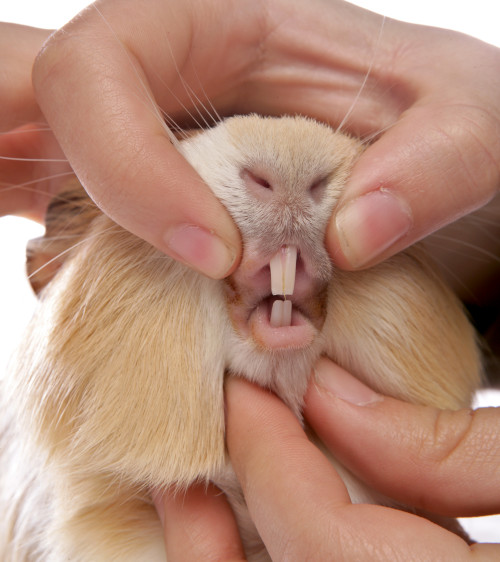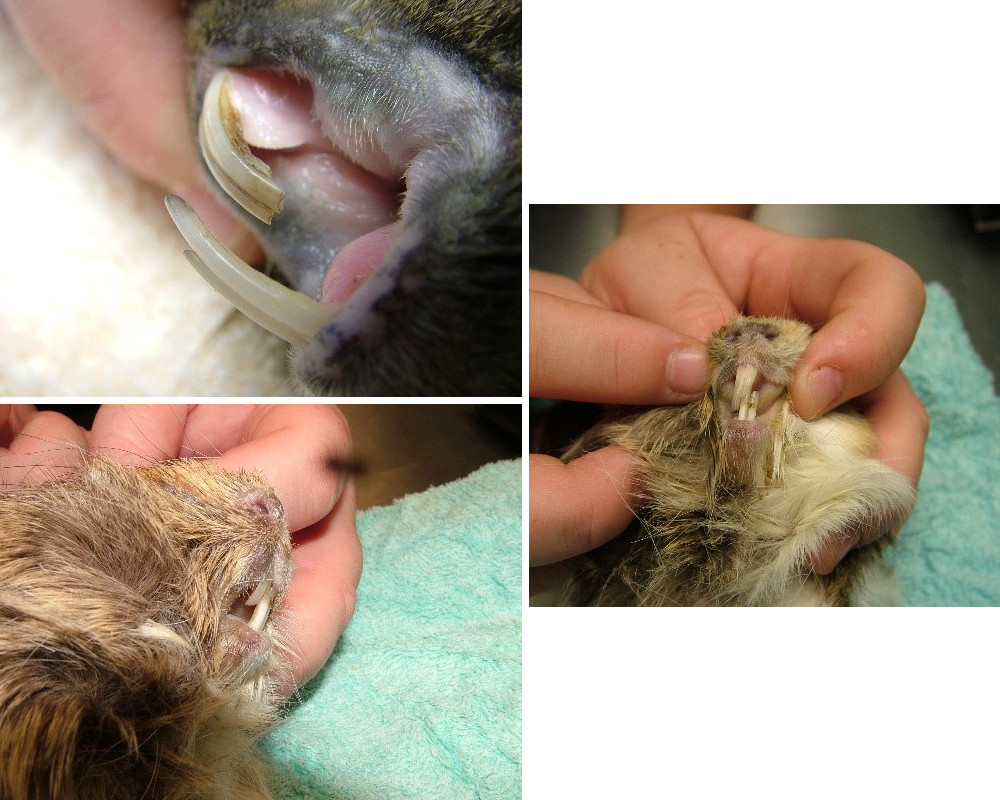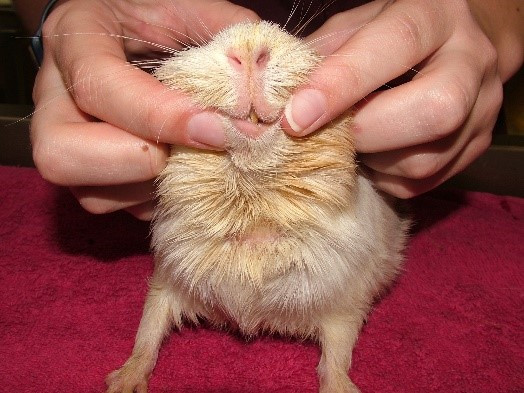What dental problems do guinea pigs get?
Guinea pigs (and rabbits) are very different from many other companion animals in that their teeth continuously grow throughout their lives. They have two slender incisors on both the upper and lower jaws at the front of their mouth. Behind these, usually out of sight, are their ‘cheek’ teeth (premolars and molars). Between the incisors and the cheek teeth is a little gap called the diastema.
Because these teeth all constantly grow, they must be worn down to prevent overgrowth. This is achieved by the way guinea pigs chew and what they eat. Guinea pigs like (and need) long fibrous materials such as grass and hay. They chew this in a circular fashion which brings all the teeth ‘into wear’ and constantly wears them down. Small food items such as pellets, grain, and chaff encourage them to chew in an up and down motion, which doesn’t wear the teeth down evenly and some teeth may start to overgrow.
As well as this chewing pattern, guinea pigs need strong healthy jaw bones and teeth. The strength in the bones relies on calcium, which in turn relies on a balanced diet and access to sunlight (to allow UV light to produce vitamin D3, needed to absorb the calcium into the body). The teeth rely not only on this calcium but also on collagen to hold them firmly in their sockets – and the strength of this collagen needs vitamin C. Weak jaw bones and loose teeth will quickly lead to dental disease.
And finally, the teeth must all be aligned correctly in their positions. Abnormal alignment, known as malocclusion, can be something your guinea pig was born with (congenital) or develop after an injury or infection in one or more teeth. Your guinea pig’s teeth will all grow abnormally if only a few teeth are maloccluded.

Well aligned guinea pig’s teeth.

The photos above show abnormal/poorly aligned guinea pig’s teeth (malocclusion).
How do I know if my guinea pig has dental disease?
The most common form of dental disease in guinea pigs is the overgrowth of their cheek teeth. The mandibular (bottom jaw) cheek teeth are often the worst affected, and they can get so bad that they can grow over and totally ‘entrap’ the tongue. This prevents the tongue from moving normally, which means the guinea pig cannot eat properly.
Other forms of dental disease can include malocclusion, tooth root abscesses, the presence of sharp spurs on the edge of the teeth that can ulcerate the tongue or cheek, and broken or infected teeth.
The range of problems that can occur or develop means that there is no easy way to diagnose the problem. However, the signs seen in a guinea pig that reflect a mouth problem include:
- Pain when eating – your guinea pig might cry out when eating, drop food from their mouth while chewing, or just stop eating altogether. They may still be interested in eating, but it just hurts too much to do it properly.
- They often drool, with the saliva matting their fur around the mouth and down their front – aa condition known as the ‘slobbers’ (see photo below).
- They will stop grooming themselves, so their hair looks unkempt.
- Because they are not eating well, they often develop diarrhoea, or stop passing faecal pellets altogether.
- They will lose weight, with their spine, pelvic bones, and ribs becoming prominent.
- If abscesses are forming, there may be obvious swellings on the face and lower jaw that are painful when you touch them.

The guinea pig above has wet fur on the chin (‘slobbers’), indicating dental problems.
What will my guinea pig vet be able to do for my guinea pig?
Dental disease can be difficult to diagnose without a thorough examination. Problems with the cheek teeth are rarely visible in a conscious guinea pig – this will require your guinea pig’s veterinarian to have a good look inside the mouth, which often requires heavy sedation or a full anaesthetic. In most cases, radiographs (x-rays) or a CT are needed to look for problems under the gumline (such as infection, broken teeth, or bone disease). This will allow your vet to accurately assess how severe your guinea pig’s dental disease is and decide on the best treatment plan.
The treatment options available depend on the severity of the dental disease. For mild cases, the treatment may be as simple as increasing the amount of hay or grass in your guinea pig’s diet.
For more serious cases, a dental procedure under general anaesthesia may be needed. This involves using a specialised diamond-coated dental burr to carefully correct your guinea pig’s teeth back to the length and angle that they should be. In some advanced cases, tooth extraction is needed.
Many guinea pigs with dental disease will need regular dental procedures every 1-2 months, perhaps for their whole life. This is because, unfortunately, unless the disease is caught early, it is very difficult to cure permanently. This is because the changes that have developed may be permanent and, with the constant growth of teeth, they will continue to grow back abnormally.
If your guinea pig is diagnosed with dental disease, it is important that you have a frank discussion with your vet about the need for repeated treatments, the guarded prognosis (the outcome of treatment is uncertain and potentially negative), and ongoing costs before treatment starts. Sadly, in many cases, euthanasia may be the most appropriate treatment for your little pet.
Prevention
The good news is that while dental disease is often difficult to treat it is generally easy to prevent.
- Ensure your guinea pigs aregetting plenty of hay and grass in their diet. Avoid the so-called muesli mixes sold in many pet shops, supermarkets, and produce stores/agencies.
- Make sure your guinea pigs are getting vitamin C in their diet. (Did you know there are chewable vitamin C tablets made just for guinea pigs? They love them!)
- Allow your guinea pigs some time out in the sun for a few hours a week. (Make sure they don’t become too hot!)
- Weigh your guinea pigs every week and give them a quick check up. Any unexplained weight loss or other abnormalities should be investigated with your vet immediately.
- Regular check-ups by an experienced guinea pig vet are recommended, as they allow dental disease to be detected early and addressed before it is too late.
Was this article helpful?
This work is licensed under a Creative Commons Attribution-NonCommercial-NoDerivatives 4.0 International License.


